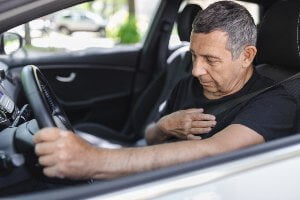 At-fault drivers make a lot of arguments about why they should not be held liable for a crash. While many of these arguments are flimsy, some may sound reasonable. For example, if the other driver says he or she had a seizure or briefly lost consciousness.
At-fault drivers make a lot of arguments about why they should not be held liable for a crash. While many of these arguments are flimsy, some may sound reasonable. For example, if the other driver says he or she had a seizure or briefly lost consciousness.
The question is whether the law allows drivers to use a sudden medical emergency as a defense from liability. Below, we explain car crashes caused by sudden medical emergencies and whether drivers can use a medical issue as a defense in Pennsylvania.
If you were injured by another driver in a crash, contact Schmidt Kramer to learn more about filing a claim. Our Harrisburg-based auto accident lawyers do not charge upfront fees to represent crash victims.
Call our firm to schedule a free legal consultation. Phone: (717) 727-2550.
What Is a Sudden Medical Emergency?
A sudden medical emergency is an unforeseen medical event that incapacitates the victim. When drivers experience a sudden medical emergency, they become incapable of controlling their vehicles, often causing collisions. These emergencies arise without warning, leaving little to no time for drivers to react or take preventive measures.
Examples of sudden medical emergencies include:
- Heart attack/cardiac arrest: This causes sudden, intense chest pain that severely limits the driver’s ability operate the vehicle.
- Stroke: This is a sudden interruption of blood supply to the brain, causing loss of motor control, speech and vision.
- Epileptic seizures: Uncontrolled electrical disturbances in the brain can lead to convulsions, sensory disturbances and loss of consciousness.
- Severe hypoglycemia: This happens when your blood sugar drops to an excessively low level. This condition can result in confusion, shakiness and fainting.
Sometimes drivers had no reason to suspect these things would happen. Other times, drivers were aware of their medical issues and the potential for a sudden emergency, such as if they recently suffered a heart attack or were diagnosed with epilepsy. Drivers may have known their blood sugar was dangerously low, raising the question of whether they should have been on the road.
How Could a Sudden Medical Emergency Cause a Collision?
A medical emergency can make it much more difficult for a driver to control his or her vehicle. Here are some of the reasons why:
- Loss of consciousness: Conditions that cause fainting or blackouts give the driver no ability to control his or her vehicle. Heart attacks and hypoglycemia can cause drivers to black out or faint.
- Impaired motor functions: A stroke or seizure might impair a driver’s ability to maneuver the vehicle effectively. He or she may not be able to press the brake or turn the steering wheel to avoid a collision.
- Visual disturbances: Visual disturbances can cause drivers to misjudge distances and speed. They may also not be able to see traffic signals or road hazards.
- Cognitive impairment: Some medical emergencies cause drivers to feel disoriented, confused or panicked. This impairs decision-making, which may increase the risk of dangerous maneuvers.
Does Pennsylvania Allow the Sudden Medical Emergency Defense?
Pennsylvania case law recognizes the potential for sudden medical emergencies that can make it much more difficult to prevent an accident. In these situations, drivers are not going to be held to the same standard of care.
In 2020, Pennsylvania’s Supreme Court reviewed the sudden emergency doctrine in the case of Graham v. Check. The court ruled that the sudden emergency doctrine should not be thought of as a defense. Instead, a sudden medical emergency should be just one of the many considerations when evaluating liability.
This means drivers cannot be absolved of liability simply by citing a sudden medical emergency. It may be possible to reduce a driver’s percentage of fault based on a medical emergency.
The court also explained how its decision may be applied to pedestrian car crash cases, as the Graham case involved a pedestrian crash. The court said it would be difficult to envision a situation where a driver could be absolved of liability for hitting a pedestrian who was legally in a crosswalk, purely based on a sudden medical emergency.
Another takeaway from this court case is that the emergency does not diminish the standard of care for the party that is seeking to benefit from the sudden medical emergency doctrine.
It is important to note how the state supreme court’s ruling helps shift the burden of proof of a sudden medical emergency to the defendant. In the past, it was almost as if the burden of proof was on the victim to prove a sudden medical emergency did not happen.
Call Schmidt Kramer Today To Discuss Your Car Crash Claim
If you are dealing with the aftermath of a collision that may involve a sudden medical emergency, we are here to help. There are no upfront costs with our services. Accepting injury cases on contingency makes it possible for everyone to access legal representation, regardless of their financial situation.
Schmidt Kramer has secured millions for auto accident victims in Pennsylvania. The initial consultation for our services is free of charge.
Give us a call today to learn more: (717) 727-2550.

